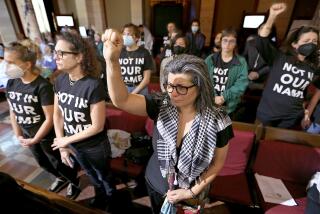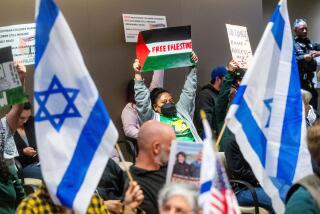AFL-CIO Supports Arias Peace Proposal
- Share via
MIAMI BEACH, Fla. — The AFL-CIO adopted a strong resolution Tuesday supporting the Central American peace plan of Costa Rican President Oscar Arias.
The resolution was adopted by voice vote without dissent by the 726 delegates to the labor group’s biennial convention here and was part of a lengthy measure on foreign affairs issues.
“We urge the Reagan Administration to pursue in good faith a diplomatic rather than a military solution to the conflict within the framework” of the Arias plan “that will provide for guarantees of democratic freedoms along with a halt to outside aid to all armed opposition groups” in the area, the resolution said.
Withdrawal of Aid
In particular, the resolution noted that the Nicaraguan Confederation of Trade Union Unity, known by the initials CUS, “has called for a withdrawal of U.S. military assistance to the Contras as well as the withdrawal of Soviet/Cuban military assistance to the Sandinistas.”
“We lend our voices to this call and will redouble our efforts to assist the CUS in promoting dialogue between the Nicaraguan government and its opposition, and to seek a settlement of the conflict based on” the Arias plan “which the CUS supports and which includes guarantees of freedom of association, freedom of the press and free and honest elections,” the resolution added.
The measure was supported by liberal union presidents who have been strongly critical of President Reagan’s policies in Central America and by union presidents who are considered more conservative and are staunch anti-communists.
Differing Interpretations
It was clear from interviews and convention floor speeches that liberals and conservatives had different interpretations of what the resolution’s language meant. Their sharply contrasting presentations reflected a continuation of a long dispute in the labor federation over foreign affairs.
At the 1985 AFL-CIO convention in Anaheim, Calif., there was a bitter floor debate over U.S. policy in Central America, before delegates adopted a resolution saying that “a negotiated settlement, rather than military victory, holds the best hope” for achieving peace and democracy in Nicaragua and El Salvador. The resolution did not specifically denounce or approve U.S. aid to the Nicaraguan Contras, who have waged guerrilla warfare against the Sandinista government.
Jack Sheinkman, president of the Amalgamated Clothing and Textile Workers Union, said Tuesday that this year’s resolution “represented an incremental, positive step forward” for the AFL-CIO. Sheinkman has been one of the labor leaders most critical of Reagan’s policy. He accused the President of trying to “illegally destroy Nicaragua” and of attempting to “torpedo” the Arias plan by continuing to push for an additional $270 million in aid to the Contras. “This federation is taking an unequivocal stand--no military aid to the Contras--and telling that to our friends in Congress.”
Critic of Sandinistas
But Albert Shanker, president of the American Federation of Teachers, who is perhaps the labor leader most critical of the Sandinistas, contended that Sheinkman had overstated the meaning of the resolution. “I’m against Contra aid right now as long as the Arias plan is moving,” Shanker said. “I don’t think you can read into it unilateral opposition to aid to the Contras.” And staff members of the vigorously anti-communist American Institute for Free Labor Development, the AFL-CIO’s Latin American arm, added that withdrawal of aid to the Contras was linked to a simultaneous withdrawal of aid to Nicaragua by the Soviet Union and Cuba.
However, Don Stillman, governmental affairs director of the United Auto Workers, noted that language saying that AFL-CIO support for withdrawal of aid to the Contras had to be specifically tied to a Soviet and Cuban withdrawal of aid to the Sandinistas had been dropped from the resolution during negotiations on the measure earlier this month.
More to Read
Sign up for Essential California
The most important California stories and recommendations in your inbox every morning.
You may occasionally receive promotional content from the Los Angeles Times.










